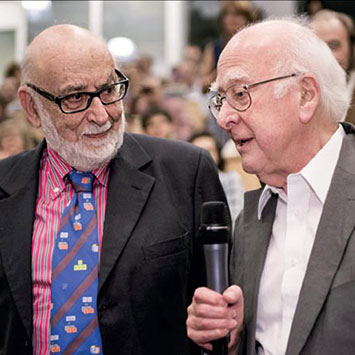US Scientists Celebrate Nobel Prize for Higgs Discovery
October 8, 2013
The following news release about a Nobel Prize related to the Higgs boson discovered at the Large Hadron Collider (LHC) is being issued jointly by the U.S. Department of Energy's Brookhaven National Laboratory and Fermi National Accelerator Laboratory on behalf of the U.S. LHC organization.

François Englert and Peter W. Higgs at CERN on July 4, 2012, when the first results indicating the presence of a particle with characteristics of the Higgs boson were announced by the LHC's ATLAS and CMS collaborations.
The Royal Swedish Academy of Sciences today awarded the Nobel Prize in physics to theorists Peter Higgs and Francois Englert to recognize their work developing the theory of what is now known as the Higgs field, which gives elementary particles mass. U.S. scientists played a significant role in advancing the theory and in discovering the particle that proves the existence of the Higgs field, the Higgs boson.
In the 1960s, Higgs and Englert, along with other theorists, including Robert Brout, Tom Kibble, and Americans Carl Hagen and Gerald Guralnik, published papers introducing key concepts in the theory of the Higgs field. In 2012, scientists on the international ATLAS and CMS experiments, performed at the Large Hadron Collider at CERN laboratory in Europe, confirmed this theory when they announced the discovery of the Higgs boson.
America had a very large role in the discovery of the Higgs particle and continues to have a leading role in the ongoing studies of the boson's properties. This video describes some of the contributions of U.S. universities and laboratories.
Nearly 2000 physicists from U.S. institutions—including 89 U.S. universities and seven U.S. Department of Energy laboratories—participate in the ATLAS and CMS experiments, making up about 23 percent of the ATLAS collaboration and 33 percent of CMS at the time of the Higgs discovery. Brookhaven National Laboratory serves as the U.S. hub for the ATLAS experiment, and Fermi National Accelerator Laboratory serves as the U.S. hub for the CMS experiment. U.S. scientists provided a significant portion of the intellectual leadership on Higgs analysis teams for both experiments.
"It is an honor that the Nobel Committee recognizes these theorists for their role in predicting what is one of the biggest discoveries in particle physics in the last few decades," said Fermilab Director Nigel Lockyer. "I congratulate the whole particle physics community for this achievement."
The majority of U.S. scientists participating in LHC experiments work primarily from their home institutions, remotely accessing and analyzing data through high-capacity networks and grid computing. The United States plays an important role in this distributed computing system, providing 23 percent of the computing power for ATLAS and 40 percent for CMS. The United States also supplied or played a leading role in several main components of the two detectors and the LHC accelerator, amounting to a value of $164 million for the ATLAS detector, $167 million for the CMS detector, and $200 million for the LHC. Support for the U.S. effort comes from the U.S. Department of Energy Office of Science and the National Science Foundation.
"It's wonderful to see a 50-year-old theory confirmed after decades of hard work and remarkable ingenuity," said Brookhaven National Laboratory Director Doon Gibbs. "The U.S. has played a key role, contributing scientific and technical expertise along with essential computing and data analysis capabilities—all of which were necessary to bring the Higgs out of hiding. It's a privilege to share in the success of an experiment that has changed the face of science."
The discovery of the Higgs boson at CERN was the culmination of decades of effort by physicists and engineers around the world, at the LHC but also at other accelerators such as the Tevatron accelerator, located at Fermilab, and the Large Electron Positron accelerator, which once inhabited the tunnel where the LHC resides. Work by scientists at the Tevatron and LEP developed search techniques and eliminated a significant fraction of the space in which the Higgs boson could hide.
Higgs and Englert published their papers independently, and did not meet in person until the July 4, 2012, announcement of the discovery of the Higgs boson at CERN. Higgs, 84, is a professor emeritus at the University of Edinburgh in Scotland. Englert, 80, is a professor emeritus at Universite libre de Bruxelles in Belgium.
The prize was announced this morning at 6:45 a.m. EDT.
ATLAS/BNL Physicist Marc-Andre Pleier explains his role in analyzing data from the Large Hadron Collider and the search for the Higgs boson.
Media contacts
- Andre Salles, Fermilab Office of Communication, 630-840-3351, media@fnal.gov
- Karen McNulty Walsh, Brookhaven Lab Media and Communications Office, 631-344-8350, kmcnulty@bnl.gov
Science contacts
- Srinivasan Rajagopalan, ATLAS Experiment, Brookhaven Lab, 631-344-5478, srinir@bnl.gov
- Howard Gordon, ATLAS Experiment, Brookhaven Lab, 631-344-3740, gordon@bnl.gov
- Don Lincoln, CMS experiment, Fermilab, 630-770-7982, lincoln@fnal.gov
- Joel Butler, CMS experiment, Fermilab, 630-651-4619, butler@fnal.gov
- Patty McBride, CMS experiment, Fermilab, 312-375-6825, mcbride@fnal.gov
2013-11579 | INT/EXT | Newsroom









